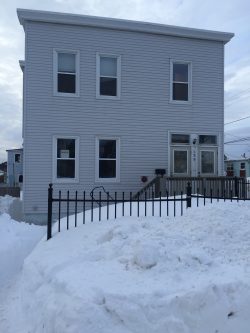There are various residential options for individuals in Saint John.
JHS provides a range of Housing options to meet the needs of our community. The JHS provides a case managed, client driven approach to housing. Housing services link a person’s unique challenges with a range of treatment and support services that are individualized and culturally-appropriate, addressing: supervision concerns; housing stability; addictions, disability and mental health needs; educational and employment options; relationship and communication difficulties and life skills.
Hart House
Community-Based Residential Facilitates (CBRF) provide a bridge between the institution and the community working on a system of gradual, supervised release and offering programming which may include life skills, substance abuse, mental health assistance, education, employment and/or crisis counselling. A safe and value added means of community reintegration providing cost reduction outcomes within the community.
Hart House is a residential facility that offers accommodations to federal and provincial offenders, day and full parolees and individuals on temporary absences. Hart House mandate is to offer a home-like environment to individuals in conflict with the law, providing an atmosphere where individuals can receive counseling, guidance, encouragement and support necessary for personal growth and development, which facilitates successful integration into society.
Hart House is a residential facility that offers accommodations to federal and provincial offenders, day and full parolees and individuals on temporary absences. Hart House mandate is to offer a home-like environment to individuals in conflict with the law, providing an atmosphere where individuals can receive counseling, guidance, encouragement and support necessary for personal growth and development, which facilitates successful integration into society.
Grant Home
People with serious mental illness are disproportionately affected by homelessness. A stable and supported living environment is essential to maintaining the health and well-being of people with serious mental illness and is integral to their recovery. Housing with support can generate positive outcomes, including enhanced life skills, improved health status, an increased sense of empowerment and involvement in the community.
Grant Home provides supports which are individualized to a person’s needs promoting recovery and independence, keeping people healthy and minimize the use of emergency services. Grant Home’s supported housing approach is considered a best practice model and has demonstrated positive outcomes in community residency, satisfaction and quality of life.
Grant Home provides supports which are individualized to a person’s needs promoting recovery and independence, keeping people healthy and minimize the use of emergency services. Grant Home’s supported housing approach is considered a best practice model and has demonstrated positive outcomes in community residency, satisfaction and quality of life.
Maloney Groupcare Home
For people with severe mental illness, secure housing with supports is an important component of recovery, providing several advantages including a reduction in hospital re-admissions, psychiatric symptoms, and substance use, as well as improved housing and financial stability, quality of life, and satisfaction with living situation. Homes aimed specifically at treating people with complex and serious mental illnesses, which are often resistant to treatment, provide counselling, address psychotherapy and promote recovery, rehabilitation and community reintegration.

[/one_half_first]
Maloney Groupcare Home is a transitional community based residential home for individuals who require long term residential care with extensive life/ social skills training for future independent success. Residents who are emotionally and behaviorally challenged are provided a continuum of specialized opportunities encompassing motivation for treatment readiness, skill acquisition and “real” life practice of skills enabling first steps toward a positive change in lifestyle. The home is designed for people who require the availability of 24 hour care and supervision within a secure setting.
Webster Home provides co-ed supports which are individualized to a person’s needs promoting recovery and independence, keeping people healthy and minimize the use of emergency services. Webster Home’s supported housing approach is considered a best practice model and has demonstrated positive outcomes in community residency, satisfaction and quality of life.

[/one_half_first]
Webster Home
For people with severe mental illness, secure housing with supports is an important component of recovery, providing several advantages including a reduction in hospital re-admissions, psychiatric symptoms, and substance use, as well as improved housing and financial stability, quality of life, and satisfaction with living situation. Homes aimed specifically at treating people with complex and serious mental illnesses, which are often resistant to treatment, provide counselling, address psychotherapy and promote recovery, rehabilitation and community reintegration.Adelaide Home
People with serious mental illness are disproportionately affected by homelessness. A stable and supported living environment is essential to maintaining the health and well-being of people with serious mental illness and is integral to their recovery. Housing with support can generate positive outcomes, including enhanced life skills, improved health status, an increased sense of empowerment and involvement in the community.
Adelaide Home provides co-ed supports which are individualized to a person’s needs promoting recovery and independence, keeping people healthy and minimize the use of emergency services. Adelaide Home’s supported housing approach is considered a best practice model and has demonstrated positive outcomes in community residency, satisfaction and quality of life.
Peters Street Transitional Apartments
Transitional housing provides supportive, temporary accommodation that bridges the gap from homelessness to permanent housing by offering structure, supervision, support (for addictions and mental health, for instance), life skills, and in some cases, education and training. The aim is to address critical issues necessary to maintain permanent housing and maximize self-sufficiency – developing stable social connections and neighbourhood supports.
Peters Street Transitional Apartments are Independent apartments for youth and young adults transitioning from a state of homelessness and/or group home care. Individual case management provides the support, resources and skills enhancing self-efficiency.
Peters Street Transitional Apartments are Independent apartments for youth and young adults transitioning from a state of homelessness and/or group home care. Individual case management provides the support, resources and skills enhancing self-efficiency.








